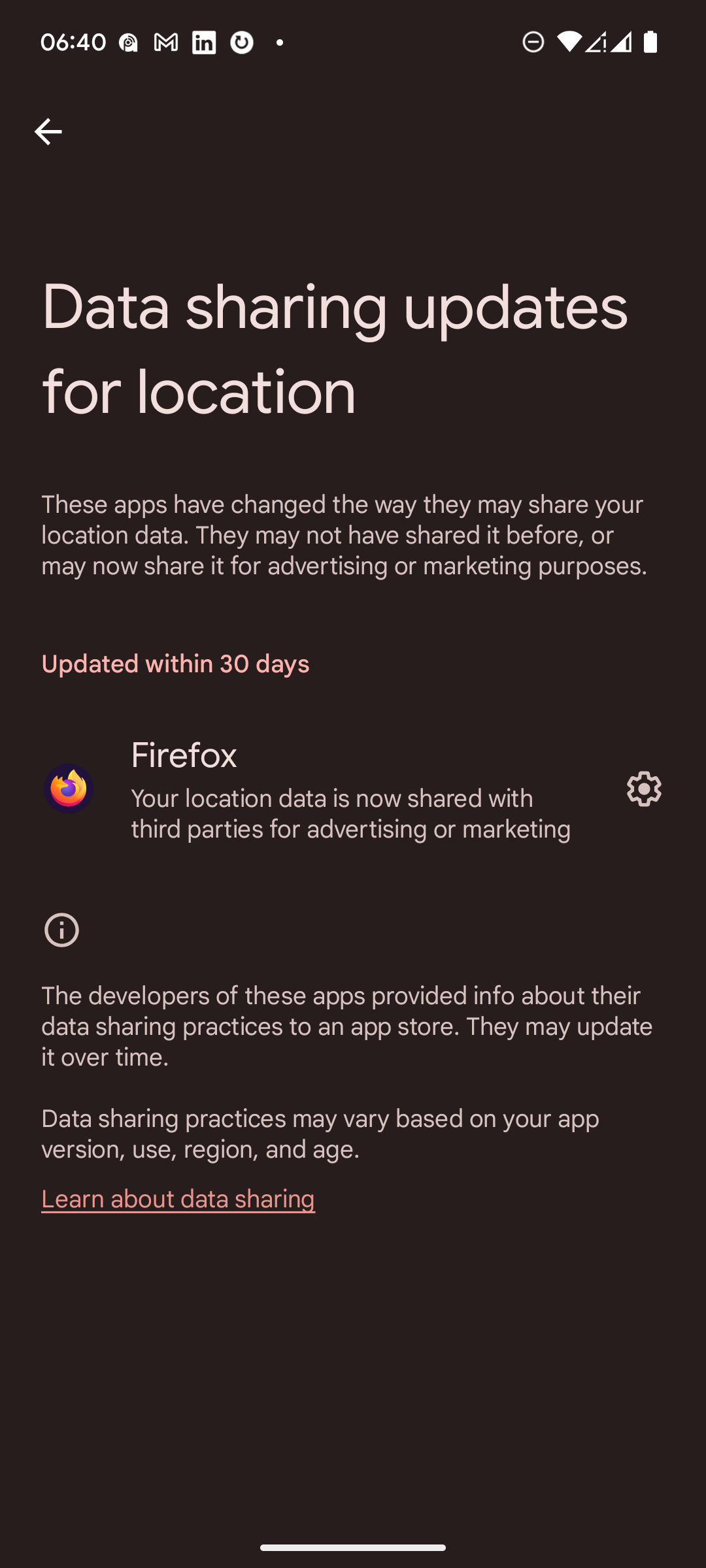Android is now warning of Firefox sharing data
-
That's not how it works. Apps cannot access the traffic of other apps, let alone decrypt it. There is no way DDG Browser does what you claim it does. They do not even claim that themselves.
EDIT: Unless, of course, it works as a VPN, which apparently it does.
It does in fact do what they claim it does, by functioning as a VPN.
You should probably try the app first before talking out of your ass.
-
pot -> kettle
-
How about turning off data sharing in whole android... Google...
-
figured as much
They're making shit up. I can assure you that the DDG app does in fact block trackers in other apps, by functioning as a VPN. Give it a try, it really does work.
-
deadass? I just use adguard
I use both adguard and the DDG app. You should be using both too.
-
Saying KHTML = WebKit is like saying a sponge is a killer whale.
"based on"
-
Firefox? You mean the company they give several hundred million dollars/year? Yeah I don't think they're too worried. They need some number of users on Firefox to prevent anti-trust issues. Which they're on the brink of right now.
you're right Google's not worried.
as for anti-trust, they're already in sentencing phase.
-
Which is chrome in a trench coat.
-
Isn't that just because Firefox got access to location data because some site asked for it?
Yep. Like a map website...
-

-
Yeah. People can avoid all this nonsense by installing one simple app... Duck duck go browser.
You don't have to use the browser. It just sits in the background quietly blocking tracking requests from other apps.
It's absolutely horrifying on first use to see how egregious tracking is.
There's also the PersonalDNSFilter which does the equivalent while being a tiny open-source app that serves only for that purpose and also somehow still not getting banned from the Google Play store or AdAway which also has this feature or TrackerControl or...
-
The legal definition of "sell" has changed in several major markets, and that's (supposedly) why Firefox has recently changed their terms. The word "sell" is now ostensibly broad enough to include "give to anybody for any reason", including if you use Firefox for any reason where you would legitimately want and need Firefox to give ("sell") your data - for example if you use it for: literally any shopping or even just browsing store pages; any interactive (real world) maps where you may want to use your location; any searches where you want local businesses to be listed; any search engine that may want to use your location to aid in results; etc. etc. etc.
Any legitimate exchange of data can now be construed as "selling" because of the new legal definitions, regardless of if anyone is actually selling anything.
It's very possible that nothing has changed - that Firefox hasn't started selling user data, they're just updating their terms (and this app listing) to reflect the changes in the legal definitions of "sell".
The whole "legal definitions are why we changed" is definitely what they're rolling with, but I don't think a lot of what you said is correct. Websites selling data is not the same as firefox selling data. If a site sells your data while you're using firefox, that is in no way shape or form involved with firefox. That's also not what they are claiming. They are strictly talking about the data that firefox directly collects and distributes. It would include search results if you searched via the address bar, I suppose. They have sold data for a while, but it's anonymized (https://support.mozilla.org/en-US/kb/sponsor-privacy).
Firefox is free to use, but it costs a lot of money to develop. They need money, nobody here is denying that. Many users on this platform have tried to avoid any form of data collection as much as possible (myself included) so they would rather pay to fund it (though many don't). However, most people would rather pay for the service with ads and data collection. Because to them, it's basically free. Most users would never even consider moving to Firefox if it was paid. They could offer two options, one paid and one "free", but they haven't done that yet and it's not clear if they plan to.
Most importantly, it's really about being transparent. If they need money, they shouldn't try to hide the fact they are selling anonymized data by saying "We never sell you data" or to be like "oh no, we are doing it because of legal definitions" when in reality they are selling data. I get it's a PR movement, but most of the people intentionally using Firefox are tech savvy people wanting to get away from Google's big brother approach. I get people defending Firefox, and I also get people hating on Mozilla, but we should also be clear about the reality. Firefox is, and has been selling your data (in some form), but now the laws are changing to make it more clear that what they're doing is in fact selling data.
-
I stopped my donations to Mozilla.
-
You just described Servo. It will happen. The Linux Foundation is backing it up now... after Mozilla dropped it.
Servo
Hm. Did not know about that. Interesting, thanks.
-
you're right Google's not worried.
as for anti-trust, they're already in sentencing phase.
Given the current administration, I'd be very unsurprised if that disappears.
-
The whole "legal definitions are why we changed" is definitely what they're rolling with, but I don't think a lot of what you said is correct. Websites selling data is not the same as firefox selling data. If a site sells your data while you're using firefox, that is in no way shape or form involved with firefox. That's also not what they are claiming. They are strictly talking about the data that firefox directly collects and distributes. It would include search results if you searched via the address bar, I suppose. They have sold data for a while, but it's anonymized (https://support.mozilla.org/en-US/kb/sponsor-privacy).
Firefox is free to use, but it costs a lot of money to develop. They need money, nobody here is denying that. Many users on this platform have tried to avoid any form of data collection as much as possible (myself included) so they would rather pay to fund it (though many don't). However, most people would rather pay for the service with ads and data collection. Because to them, it's basically free. Most users would never even consider moving to Firefox if it was paid. They could offer two options, one paid and one "free", but they haven't done that yet and it's not clear if they plan to.
Most importantly, it's really about being transparent. If they need money, they shouldn't try to hide the fact they are selling anonymized data by saying "We never sell you data" or to be like "oh no, we are doing it because of legal definitions" when in reality they are selling data. I get it's a PR movement, but most of the people intentionally using Firefox are tech savvy people wanting to get away from Google's big brother approach. I get people defending Firefox, and I also get people hating on Mozilla, but we should also be clear about the reality. Firefox is, and has been selling your data (in some form), but now the laws are changing to make it more clear that what they're doing is in fact selling data.
Which parts do you disagree with? I'm not talking about websites selling your data after you access them through Firefox, I'm saying that now - with new definitions of "sale"/"sell" - that Firefox giving anybody any data for almost any reason can be legally construed as "selling". This isn't just the case for Firefox, it's the case for literally any web browser, and anything that can access the internet for any reason.
Yes, I thought about including the fact that Firefox does engage in ad-based revenue, and I suppose I should've, but Firefox is pretty upfront about this and allows users to opt out of targeted advertising - and this has been the case since long before this past week or two. These ads only appear on the "new tab" page, and only if you consent to seeing them. Anybody who's dropping Firefox for this recent controversy seens to be missing that. It's very possible (and personally I think it's likely) that nothing at all has changed from within Firefox.
-
pot -> kettle
Explain?
-
They're making shit up. I can assure you that the DDG app does in fact block trackers in other apps, by functioning as a VPN. Give it a try, it really does work.
well damn now i dont know who to believe <:p
-
Fear, Uncertainty, Doubt. It’s more commonly used in crypto communities.
[stern stare]
Forgotten the history, have we? I was referring to Microsoft's tactics in the early 2000s.
Crypto bros have watered down the term and made it a laughing matter. They ruin everything they touch. Goddamn it.



